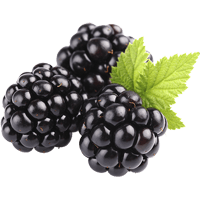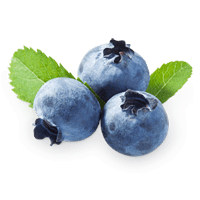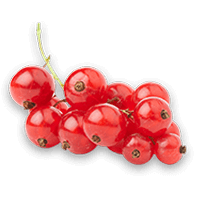Cranberries nutrition: calories, carbs, GI, protein, fiber, fats
Cranberries, raw
*all the values are displayed for the amount of 100 grams
Top nutrition facts for Cranberries
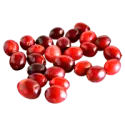
| Calories ⓘ Calories for selected serving | 46 kcal |
|
Glycemic index ⓘ
Source: Check out our full article on Cranberries glycemic index Check out our Glycemic index chart page for the full list.
|
45 (low) |
| Glycemic load | 4 (low) |
| Net Carbs ⓘ Net Carbs = Total Carbohydrates – Fiber – Sugar Alcohols | 8 grams |
| Default serving size ⓘ Serving sizes are mostly taken from FDA's Reference Amounts Customarily Consumed (RACCs) | 1 cup, chopped (110 grams) |
| Acidity (Based on PRAL) ⓘ PRAL (Potential renal acid load) is calculated using a formula. On the PRAL scale the higher the positive value, the more is the acidifying effect on the body. The lower the negative value, the higher the alkalinity of the food. 0 is neutral. | -1.3 (alkaline) |
| Oxalates ⓘ https://www.hsph.harvard.edu/nutrition-questionnaire-service-center/nutrient-tables-download-page/ | 0 mg |
Cranberries calories (kcal)
| Calories for different serving sizes of cranberries | Calories | Weight |
|---|---|---|
| Calories in 100 grams | 46 | |
| Calories in 1 cup, chopped | 51 | 110 g |
| Calories for different varieties of cranberries | Calories | Weight |
|---|---|---|
| Cranberries, raw (this food) | 46 | 100 g |
| Cranberries, wild, bush, raw (Alaska Native) | 55 | 100 g |
Cranberries Glycemic index (GI)
Source:
Check out our full article on Cranberries glycemic index
Check out our Glycemic index chart page for the full list.
Cranberries Glycemic load (GL)
Mineral coverage chart
Mineral chart - relative view
Vitamin coverage chart
Vitamin A:
9µg of 900µg
1%
Vitamin E:
4mg of 15mg
26%
Vitamin D:
0µg of 20µg
0%
Vitamin C:
42mg of 90mg
47%
Vitamin B1:
0.04mg of 1mg
3%
Vitamin B2:
0.06mg of 1mg
4.6%
Vitamin B3:
0.3mg of 16mg
1.9%
Vitamin B5:
0.89mg of 5mg
18%
Vitamin B6:
0.17mg of 1mg
13%
Folate:
3µg of 400µg
0.75%
Vitamin B12:
0µg of 2µg
0%
Vitamin K:
15µg of 120µg
13%
Vitamin chart - relative view
Macronutrients chart
Protein:
Daily Value: 1%
0.5 g of 50 g
0.5 g (1% of DV )
Fats:
Daily Value: 0%
0.1 g of 65 g
0.1 g (0% of DV )
Carbs:
Daily Value: 4%
12 g of 300 g
12 g (4% of DV )
Water:
Daily Value: 4%
87.3 g of 2,000 g
87.3 g (4% of DV )
Other:
0.1 g
0.1 g
Protein quality breakdown
Tryptophan:
9mg of 280mg
3.2%
Threonine:
84mg of 1,050mg
8%
Isoleucine:
99mg of 1,400mg
7.1%
Leucine:
159mg of 2,730mg
5.8%
Lysine:
117mg of 2,100mg
5.6%
Methionine:
9mg of 1,050mg
0.86%
Phenylalanine:
108mg of 1,750mg
6.2%
Valine:
135mg of 1,820mg
7.4%
Histidine:
54mg of 700mg
7.7%
Fat type information
Saturated fat:
0.01 g
Monounsaturated fat:
0.02 g
Polyunsaturated fat:
0.06 g
Carbohydrate type breakdown
Starch:
0 g
Sucrose:
0.16 g
Glucose:
3.4 g
Fructose:
0.67 g
Lactose:
0 g
Maltose:
0 g
Galactose:
0 g
Fiber content ratio for Cranberries
Sugar:
4.3 g
Fiber:
3.6 g
Other:
4.1 g
All nutrients for Cranberries per 100g
| Nutrient | Value | DV% | In TOP % of foods | Comparison |
| Vitamin A | 3µg | 0% | 62% | |
| Calories | 46kcal | 2% | 89% |
Equal to Orange
|
| Protein | 0.46g | 1% | 90% |
6.1 times less than Broccoli
|
| Fats | 0.13g | 0% | 91% |
256.2 times less than Cheese
|
| Vitamin C | 14mg | 16% | 22% |
3.8 times less than Lemon
|
| Net carbs | 8.4g | N/A | 49% |
6.5 times less than Chocolate
|
| Carbs | 12g | 4% | 45% |
2.4 times less than Rice
|
| Cholesterol | 0mg | 0% | 100% |
N/A
|
| Vitamin D | 0µg | 0% | 100% |
N/A
|
| Magnesium | 6mg | 1% | 90% |
23.3 times less than Almonds
|
| Calcium | 8mg | 1% | 82% |
15.6 times less than Milk
|
| Potassium | 80mg | 2% | 87% |
1.8 times less than Cucumber
|
| Iron | 0.23mg | 3% | 88% |
11.3 times less than Beef broiled
|
| Sugar | 4.3g | N/A | 50% |
2.1 times less than Coca-Cola
|
| Fiber | 3.6g | 14% | 23% |
1.5 times more than Orange
|
| Copper | 0.06mg | 6% | 77% |
2.5 times less than Shiitake
|
| Zinc | 0.09mg | 1% | 91% |
70.1 times less than Beef broiled
|
| Starch | 0g | 0% | 100% |
N/A
|
| Phosphorus | 11mg | 2% | 92% |
16.5 times less than Chicken meat
|
| Sodium | 2mg | 0% | 96% |
245 times less than White bread
|
| Vitamin E | 1.3mg | 9% | 43% |
1.1 times less than Kiwi
|
| Selenium | 0.1µg | 0% | 96% | |
| Manganese | 0.27mg | 12% | 47% | |
| Vitamin B1 | 0.01mg | 1% | 91% |
22.2 times less than Pea raw
|
| Vitamin B2 | 0.02mg | 2% | 92% |
6.5 times less than Avocado
|
| Vitamin B3 | 0.1mg | 1% | 91% |
94.8 times less than Turkey meat
|
| Vitamin B5 | 0.3mg | 6% | 74% |
3.8 times less than Sunflower seeds
|
| Vitamin B6 | 0.06mg | 4% | 76% |
2.1 times less than Oats
|
| Vitamin B12 | 0µg | 0% | 100% |
N/A
|
| Vitamin K | 5µg | 4% | 56% |
20.3 times less than Broccoli
|
| Trans fat | 0g | N/A | 100% |
N/A
|
| Folate | 1µg | 0% | 93% |
61 times less than Brussels sprouts
|
| Saturated fat | 0.01g | 0% | 94% |
736.9 times less than Beef broiled
|
| Choline | 5.5mg | 1% | 91% | |
| Monounsaturated fat | 0.02g | N/A | 90% |
544.4 times less than Avocado
|
| Polyunsaturated fat | 0.06g | N/A | 89% |
857.7 times less than Walnut
|
| Tryptophan | 0mg | 0% | 98% |
101.7 times less than Chicken meat
|
| Threonine | 0.03mg | 0% | 96% |
25.7 times less than Beef broiled
|
| Isoleucine | 0.03mg | 0% | 95% |
27.7 times less than Salmon raw
|
| Leucine | 0.05mg | 0% | 95% |
45.9 times less than Tuna Bluefin
|
| Lysine | 0.04mg | 0% | 96% |
11.6 times less than Tofu
|
| Methionine | 0mg | 0% | 98% |
32 times less than Quinoa
|
| Phenylalanine | 0.04mg | 0% | 95% |
18.6 times less than Egg
|
| Valine | 0.05mg | 0% | 95% |
45.1 times less than Soybean raw
|
| Histidine | 0.02mg | 0% | 96% |
41.6 times less than Turkey meat
|
| Fructose | 0.67g | 1% | 87% |
8.8 times less than Apple
|
| Caffeine | 0mg | 0% | 100% | |
| Omega-3 - EPA | 0g | N/A | 100% |
N/A
|
| Omega-3 - DHA | 0g | N/A | 100% |
N/A
|
| Omega-3 - DPA | 0g | N/A | 100% |
N/A
|
Check out similar food or compare with current
NUTRITION FACTS LABEL
Nutrition Facts
___servings per container
Serving Size ______________
Serving Size ______________
Amount Per 100g
Calories 46
% Daily Value*
0.2%
Total Fat
0.13g
0.04%
Saturated Fat 0.01g
0
Trans Fat
0g
0
Cholesterol 0mg
0.09%
Sodium 2mg
4%
Total Carbohydrate
12g
14%
Dietary Fiber
3.6g
Total Sugars 0g
Includes ? g Added Sugars
Protein
0.46g
Vitamin D
0mcg
0
Calcium
8mg
0.8%
Iron
0.23mg
2.9%
Potassium
80mg
2.4%
*
The % Daily Value (DV) tells you how much a nutrient in a serving of food contributes to a daily diet. 2,000 calories a day is used for general nutrition advice.
Health checks
ⓘ
Dietary cholesterol is not associated with an increased risk of coronary heart disease in healthy individuals. However, dietary cholesterol is common in foods that are high in harmful saturated fats.
Source
Low in Cholesterol
ⓘ
Trans fat consumption increases the risk of cardiovascular disease and mortality by negatively affecting blood lipid levels.
Source
No Trans Fats
ⓘ
Saturated fat intake can raise total cholesterol and LDL (low-density lipoprotein) levels, leading to an increased risk of atherosclerosis. Dietary guidelines recommend limiting saturated fats to under 10% of calories a day.
Source
Low in Saturated Fats
ⓘ
While the consumption of moderate amounts of added sugars is not detrimental to health, an excessive intake can increase the risk of obesity, and therefore, diabetes.
Source
Low in Sugars
Cranberries nutrition infographic
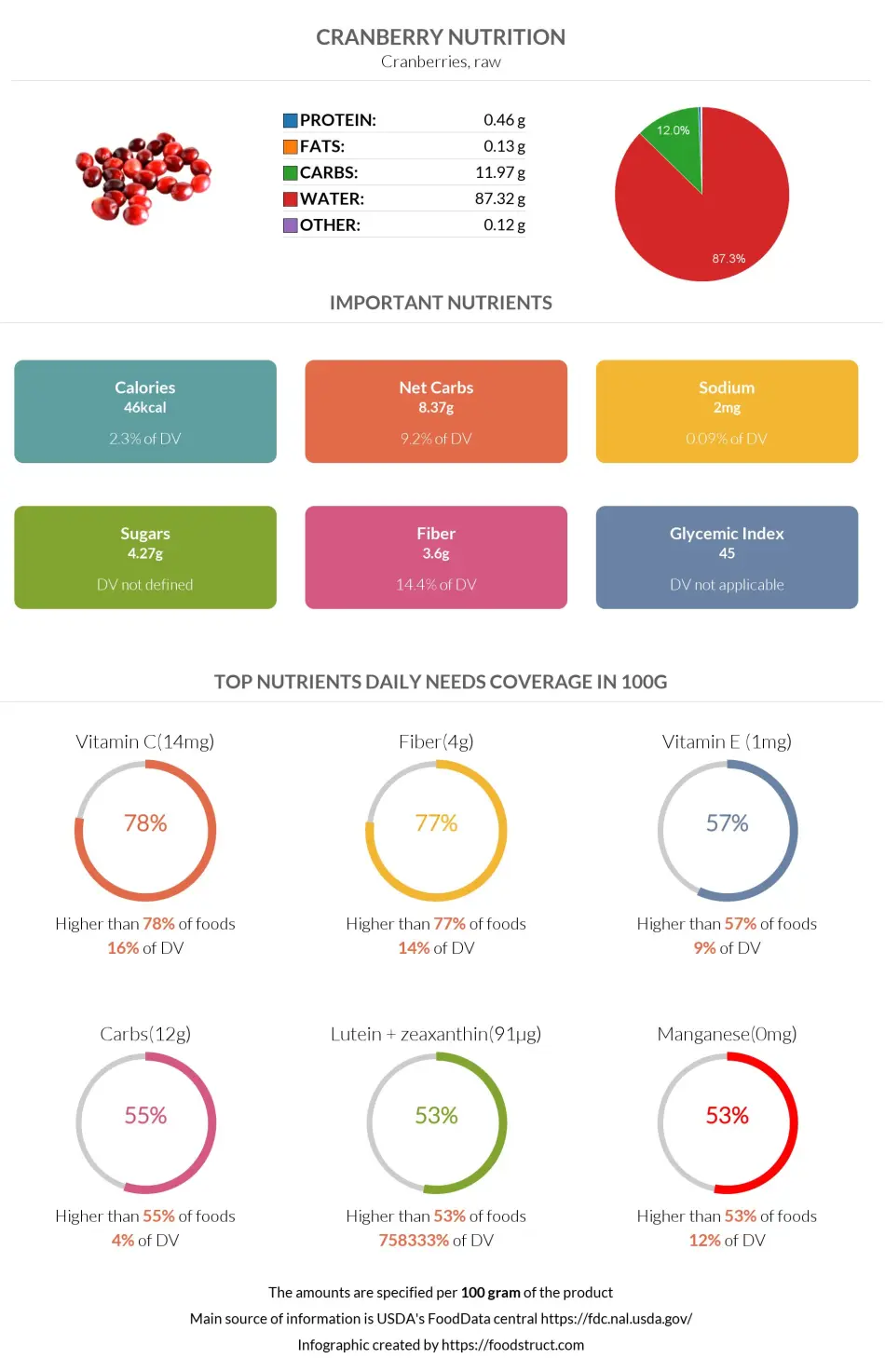
Infographic link
References
All the values for which the sources are not specified explicitly are taken from FDA’s Food Central. The exact link to the food presented on this page can be found below.
